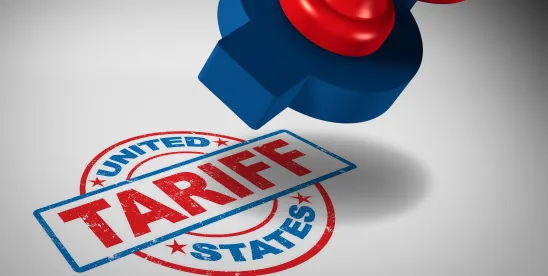This week, U.S. Customs and Border Protection (CBP) published two Notices of Proposed Rulemaking1 that could significantly impact and curtail the entry of low-value shipments not exceeding $800 (commonly known as de minimis shipments) that are eligible for duty-free and simplified entry. Companies currently relying on de minimis shipments as a strategy to reach the U.S. market, whose shipments include Chinese, steel and/or aluminum goods, may be prevented from continued use of that strategy. In addition, CBP proposes to collect new data on de minimis shipments under a new “enhanced entry process” and revisions to existing processes to better facilitate CBP’s verification of eligibility for duty- and tax-free entry of de minimis shipments.
Section 321 of the Tariff Act of 1930 allows for the informal entry of articles that have a retail value of $800 or less and are imported by one person in one day. These de minimis shipments are free of duty and taxes and are subject to expedited clearance processing.
With the rise of e-commerce, CBP is clearing historic high levels of de minimis shipments per day. That increase, coupled with the expedited clearance processing to which de minimis shipments are entitled, has prompted CBP and industry concerns about the agency’s ability to identify and prevent the shipment of illicit drugs, counterfeit or pirated goods, merchandise that poses a risk to public safety, and other contraband through de minimis shipments.
Moreover, there has been growing concern about the utilization of de minimis shipments to evade – even if legitimately – special tariffs imposed on certain imported merchandise under various trade-related statutes including Section 232 of the Trade Expansion Act of 1962 (Section 232) and Sections 201 and 301 of the Trade Act of 1974 (Sections 201 and 301). For example, tariffs are currently being imposed on steel and aluminum imports under Section 232, which authorizes the President to adjust imports — including through the use of tariffs — if excessive foreign imports are found to be a threat to U.S. national security. Certain merchandise such as solar cells and modules are subject to tariffs under Section 201, which authorizes the President to take all necessary actions including imposing tariffs if merchandise is being imported into the U.S. in such increased quantities to cause or threaten serious injury to the domestic industry producing the merchandise. Further, various goods imported from China are currently subject to duties imposed under Section 301, which authorizes the President to take retaliatory measures to address foreign governments’ unreasonable or discriminatory acts that burden U.S. commerce. Currently, de minimis shipments containing the merchandise subject to these special tariffs are nonetheless eligible to claim duty-free entry.
CBP’s dual proposed rulemakings aim to address these concerns by prohibiting shipments subject to those special tariffs from utilizing de minimis entry procedures and collecting additional data on all shipments utilizing de minimis entry procedures to verify eligibility for the program.
First, CBP proposes to make all goods subject to tariffs imposed under Sections 232, 201, and 301, whether or not the goods were granted an exclusion from such tariffs under those laws, ineligible for duty-free entry under de minimis provisions. However, CBP acknowledged a hurdle to this decision as relates to international mail shipments, noting the U.S. Postal Service (USPS) cannot collect duties directly from foreign mailers. To determine whether to exclude international mail shipments from the scope of this proposed rulemaking and handle them through a later rulemaking tailored to the international mail shipments environment, CBP is soliciting comments from the public and the USPS.
Second, CBP proposes collection of additional information on de minimis shipments under the existing basic entry process and through creation of a new enhanced entry process intended to encompass merchandise subject to partner government agency regulations and/or non-exempt from duties, taxes and fees. This new process would remove the requirement that de minimis shipments be segregated on advance manifests but require the electronic transmission of the individual bill of lading or other shipping document used to file or support entry, as well as other additional data elements, including:
- Clearance tracing identification number (CTIN);
- Country of shipment of the merchandise;
- Seller’s and purchaser’s name and address;
- Any data or documents required by other government agencies;
- Advertised retail product description;
- Marketplace’s name and website address (or, in the alternative, product picture, product identifier, or shipment x-ray or other security screening report number); and
- 10-digit Customs classification of the merchandise under the Harmonized Tariff Schedule of the United States (HTSUS).
Finally, CBP proposes to clarify the rule that when the aggregate fair retail value of shipments imported by one person on one day under the de minimis exemption exceeds $800, all such shipments imported on that day by that person become ineligible for duty- and tax-free entry under the exemption. CBP further clarifies that the “one person” eligible for the administrative exemption is “the owner or purchaser of the merchandise imported on one day.”
We expect this to be only an opening salvo in a protracted battle over the use of de minimis waged before the agency and through legislative changes over the coming year.
[1] See Entry of Low-Value Shipments, 90 Fed. Reg. 3,048 (Jan. 14, 2025), available at https://www.govinfo.gov/content/pkg/FR-2025-01-14/pdf/2025-00551.pdf; see also Trade and National Security Actions and Low-Value Shipments, 90 Fed. Reg. 6,852 (Jan. 21, 2025), available at https://www.govinfo.gov/content/pkg/FR-2025-01-21/pdf/2025-01074.pdf.






 />i
/>i

